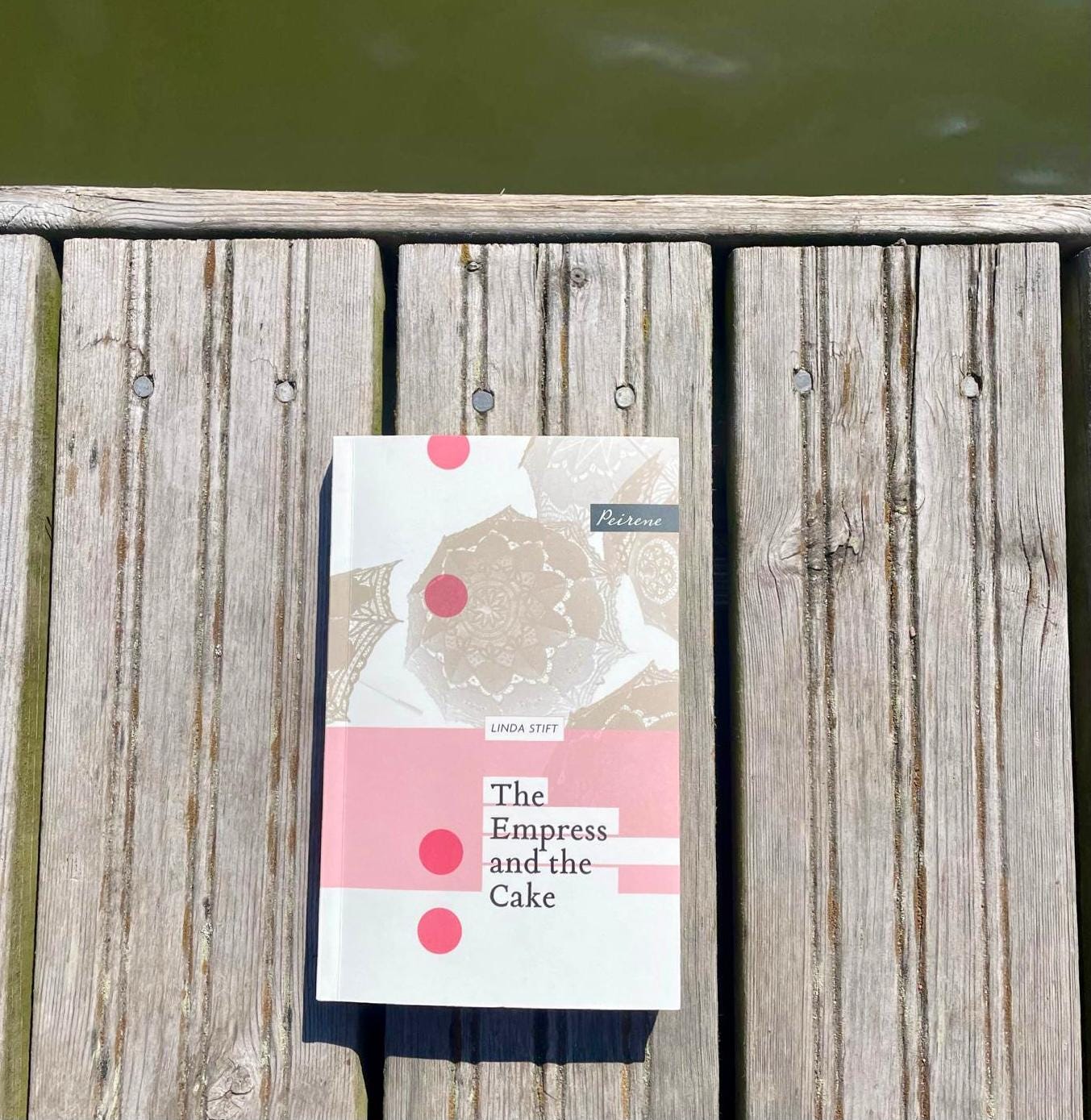Welcome to Bookmarked, a weekly newsletter following my journey as I read one book from every country. If you like the sound of my project, I’d love it if you shared Bookmarked with a friend.
Linda Stift’s The Empress and The Cake is an incredibly strange psychological thriller about how an elderly woman who is obsessed with the Empress Elisabeth of Austria, also known as Sissi, manages to seize control of a woman who is living with bulimia.
The story begins outside a bakery in Vienna when Frau Hohenembs approaches the unnamed narrator and offers to split a cake with her. On a whim, the narrator accepts the invitation—a decision she later recognises as the biggest mistake of her life. “In retrospect I can’t say why I followed her,” she says, “but I did.”
Upon entering Frau Hohenembs’ home, the narrator is surprised to discover her host’s extensive collection of Sissi memorabilia as well as an enormous dog and two caged parrots. The women are joined by Ida, Frau Hohenembs’ portly servant, and the trio sit down to drink tea and share the Gugelhupf. Upon returning home, the narrator eats everything in her fridge before forcing herself to throw up. The afternoon’s chance encounter has seemingly sent her back into an obsessive cycle of binging and vomiting—something that Frau Hohenembs uses to manipulate and control her new acquaintance.
The rest of the novel follows the narrator as Frau Hohenembs seizes control of her life. During a trip to Vienna’s sex museum, Frau Hohenembs convinces the narrator to steal a duck press, a nineteenth century device used to squeeze duck carcasses. Threatening to call the police unless the narrator complies with her wishes, Frau Hohenembs manipulates the narrator into taking part in a series of increasingly strange Sissi-themed thefts. In perhaps the novel’s most bizarre scene, Frau Hohenembs persuades the narrator to dress up as the empress and compete in an Sissi lookalike ball. By this point, Frau Hohenembs has full control over the narrator.
Falteringly, I asked Frau Hohenembs not to call me again; in her mellifluous Frau Professor German, which had a slight Bavarian twang, she replied that she only wanted to invite me for the occasional walk or museum visit. These were minor, very manageable obligations and I shouldn’t worry about being entirely owned by her, that was out of the question. If I refused she would inform the relevant authorities. The expression being entirely owned by her shocked me, even if it was out of the question. The idea would never have occurred to me; coming from her, it sounded perfectly natural and made me fear the worst.
Stift writes in unparagraphed text, which is broken up by biographical information about Sissi—the implication being, I think, that Frau Hohenembs may in fact be Sissi. In any case, it’s an extremely grotesque, often disturbing, book about power, addiction, and cruelty with lots of attention paid to the narrator’s toxic relationship with food. If it sounds like that could be triggering for you, I’d give this book a miss. But if you’re tempted to give it a go, I’d recommend giving Sissi’s Wikipedia page a quick skim for context before you start (as I understand it, Empress Sissi is to Austrians as Princess Diana is to Brits).
I’m know I’m delighted to have discovered Stift’s writing and I’m even more delighted to have discovered her publisher, Peirene Press, who specialise in translated European novellas which can be read in the same amount of time it takes to watch a film. If their other books are anything like this one, I’m excited to read more.
The Empress and the Cake by Linda Stift, translated by Jamie Bulloch (Peirene Press, 2016 / Hanser, 2007)
More books by Austrian authors
Here’s a short list of other recommendations I received this week:
Malina by Ingeborg Bachmann, tr. Philip Boehm
The Liquid Land by Raphaela Edelbauer, tr. Jen Calleja
The Weight of Things by Marianne Fritz, tr. Adrian Nathan West
The Wall by Marlen Haushofer, tr. Julian Roman Pösler
Greed by Elfriede Jelinek, tr. Martin Chalmers
Frozen Time by Anna Kim
Splithead by Julya Rabinowich
We Never Sleep by Kathrin Röggla, tr. Rebecca Thomas
Blue Jewellery by Katharina Winkler, tr. Laura Wagner
What have you read recently?
If you’ve read a brilliant book in translation or you’d like to pass on a recommendation, I’d love to hear about it! For this project, I’m focussing on contemporary fiction and short stories, with a preference for female authors—but I’m always happy to venture further afield for a good recommendation.
You can get in touch by replying to this email or leaving a comment. I’ll be featuring your recommendations in upcoming newsletters, and I’ll keep a growing list here.
Bookmarked is written by Tabatha Leggett. Thank you to Laura Radosh and Sabine Schuster from Das Literaturhaus Wien for their recommendations and Brendan Wright for introducing me to Peirene Press. If you know someone who would enjoy this newsletter, please forward it to them!




